
by Alfray Stryke
A staple of sci-fi that has long been missing from Stellaris is the ability to have fleets and stations capable of being cloaked and hiding from enemy sensors. With the addition of Awareness and improvements to interactions with pre-FTL civilizations, we felt that First Contact was the right place to explore how cloaking could be added to the game in a meaningful way, tying into warfare, exploration and espionage.
When we set out to design the cloaking and counter-cloaking systems our goals were that:
- Science ships should be able to equip cloaking devices to allow exploration of space regardless of if another empire has closed their borders to you.
- Observation posts should be capable of being hidden from the pre-FTL civilizations they were observing.
- Military vessels should be capable of cloaking, with limitations. Cloaking should be balanced such that it is better to cloak frigates or cruisers than battleships.
- Cloaking should interact with the existing espionage system.
So how does this work in practice?
Cloaking Field Generators are a new type of ship component that is limited to one per ship and occupies either an Aux slot (for designable ships) or a special cloaking device slot (for undesignable ships e.g., science ships or observation posts). The first cloaking devices available can only be equipped on corvettes, frigates, science ships and observation posts. As technology improves so does the cloaking strength provided by the cloaking devices and the size of ship they are capable of cloaking.

Basic Cloaking Field Generators unlock cloaking for corvettes, frigates and selected civilian ships.

Advanced Cloaking Field Generators unlock cloaking for destroyers.

Elite Cloaking Field Generators unlock cloaking for cruisers.
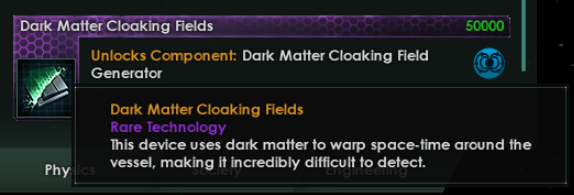
Dark Matter Cloaking Field Generators unlock cloaking for battleships and titans.
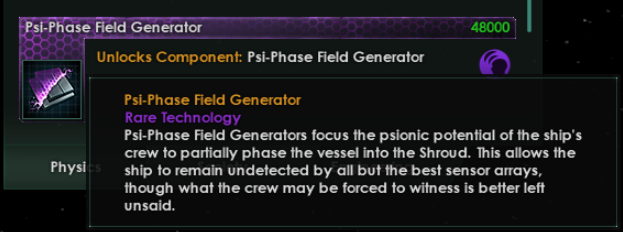
Psi-Phase Field Generators unlock cloaking for battleships and titans and offer the best cloaking strength in the game.
While cloaked, ships and fleets can ignore closed borders and can’t be detected by normal sensors. This can be useful for a variety of reasons such as having science ships explore and survey systems that might otherwise be blocked off, research anomalies or special projects inside the borders of your rivals or getting a well armed fleet situated to ambush an enemy starbase upon war declaration. Cloaked science ships will also have another trick up their sleeves, being able to perform covert reconnaissance on colonized planets to gather Intel on other empires and increasing the speed at which this Intel is gained. Finally, cloaked fleets and observation posts can’t be seen by pre-FTL civilizations, so using them will minimize your chances of accidentally increasing their Awareness.
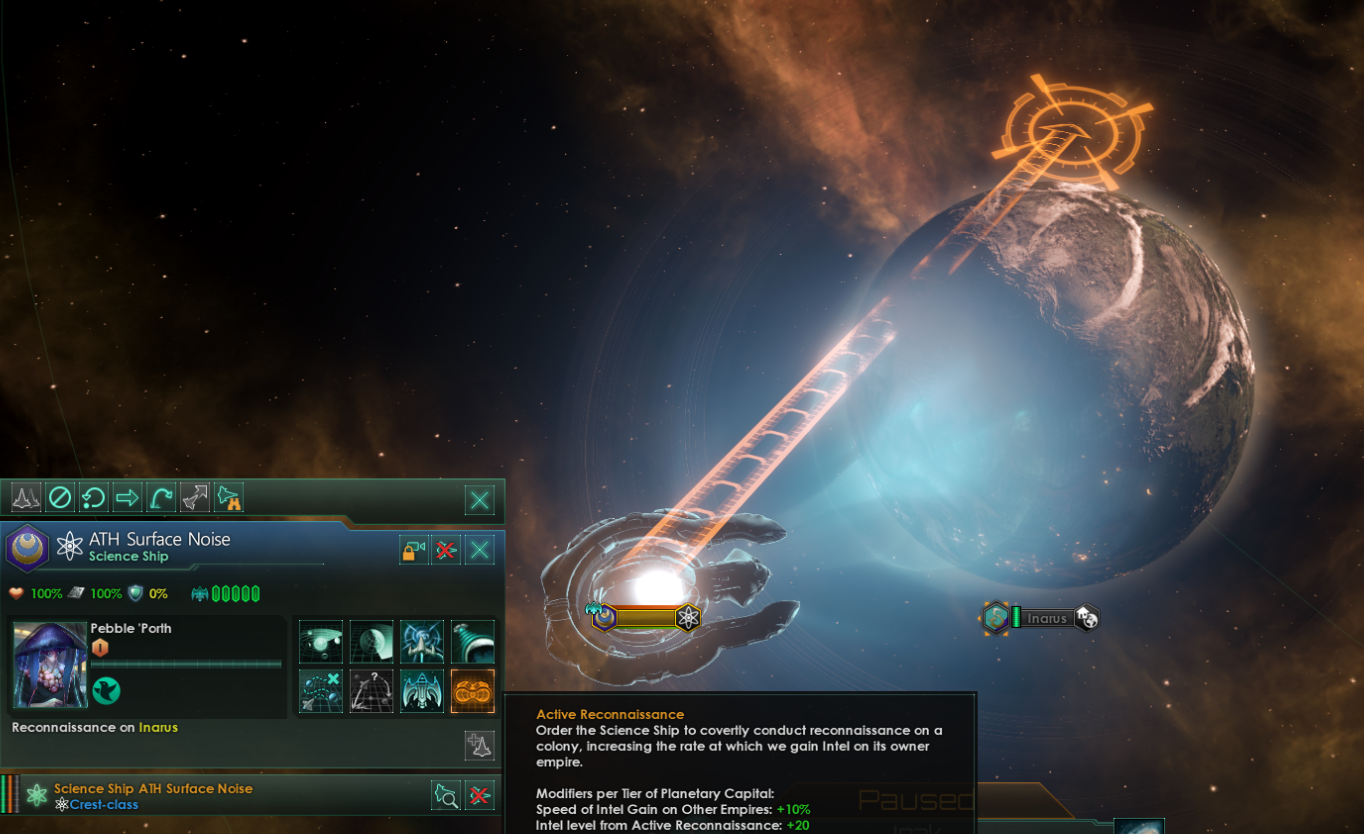
Performing reconnaissance on an enemy can provide a great deal of Intelligence.
Due to the power draw and manipulation of particle fields, cloaking imposes penalties on the shields of ships while cloaked, depending on the type of cloaking device equipped:
- Ships equipped with a Basic, Advanced or Elite Cloaking Field Generator suffer from 100% Shield Nullification while cloaked.
- Ships equipped with a Dark Matter Cloaking Field Generator have a reduced penalty of 50% Shield Nullification.
- Ships equipped with a Psi-Phase Field Generator and any regular shields will suffer from 100% Shield Nullification while cloaked.
- Ships equipped with a Psi-Phase Field Generator and psionic shields or barriers will not suffer from any Shield Nullification while cloaked.
SPOILER: SIDEBAR: SHIELD AND ARMOR NULLIFICATION CHANGES
It’s important to note here that as of 3.7 “Canis Minor”, both Shield Nullification and Armor Nullification have had a slight change. Previously, if a fleet suffered from 100% Shield Nullification (such as being in a pulsar system) and then the nullification was removed (say by leaving the system), their shields would instantly jump back up to full strength. This has been changed so that the fleet has to restore shields back to full capacity via their shield regeneration.

Spreadsheets are an important part of our design workflow!
The cloaking strength of a fleet is determined by the ship in that fleet with the lowest possible cloaking strength. Thus, in order to be able to cloak, all ships in the fleet must be capable of cloaking. How well a fleet can cloak is described by the stability of the cloaking field of a fleet and can range from Non-Existent to Exceptional depending on the cloaking strength of the fleet.
This stability (or cloaking strength) factors into both how easily a starbase can detect or reveal the cloaked fleet (more on this later) and what penalties (if any) the fleet may suffer from.
It’s worth keeping in mind that, as the cloaking strength of a fleet is determined by the ship with the lowest cloaking strength in the fleet, a fleet of mixed battleships and corvettes will have a lower cloaking strength (and be more easily detected) than a fleet solely comprised of corvettes.
The highest level of cloaking strength and the corresponding cloaking field stability obtainable purely by ship components is 5 (Very High). In order to reach strength 6 or greater and thus the various grades of Exceptional stability, your fleets will require additional sources of cloaking strength, such as finishing Subterfuge traditions or hiding in a nebula.

Cloaking Strength levels and penalties
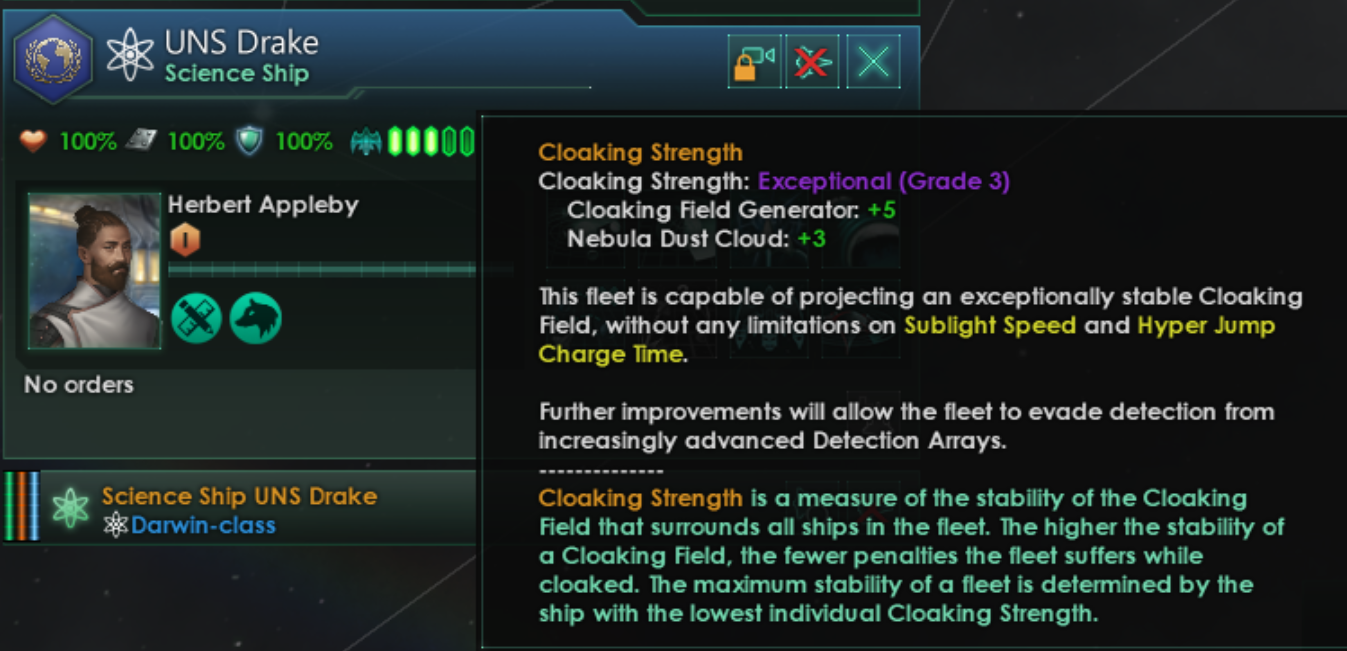
A UNE science ship makes use of a nebula to boost their cloaking strength.
In order to be detected or revealed a fleet needs to be within sensor range of an enemy starbase with a Detection Strength equal to or greater than the Cloaking Strength of the fleet. Detection Strength is normally gained by building Detection Array modules on a starbase, though certain rare technologies can unlock buildings or orders for science ships to further increase this.
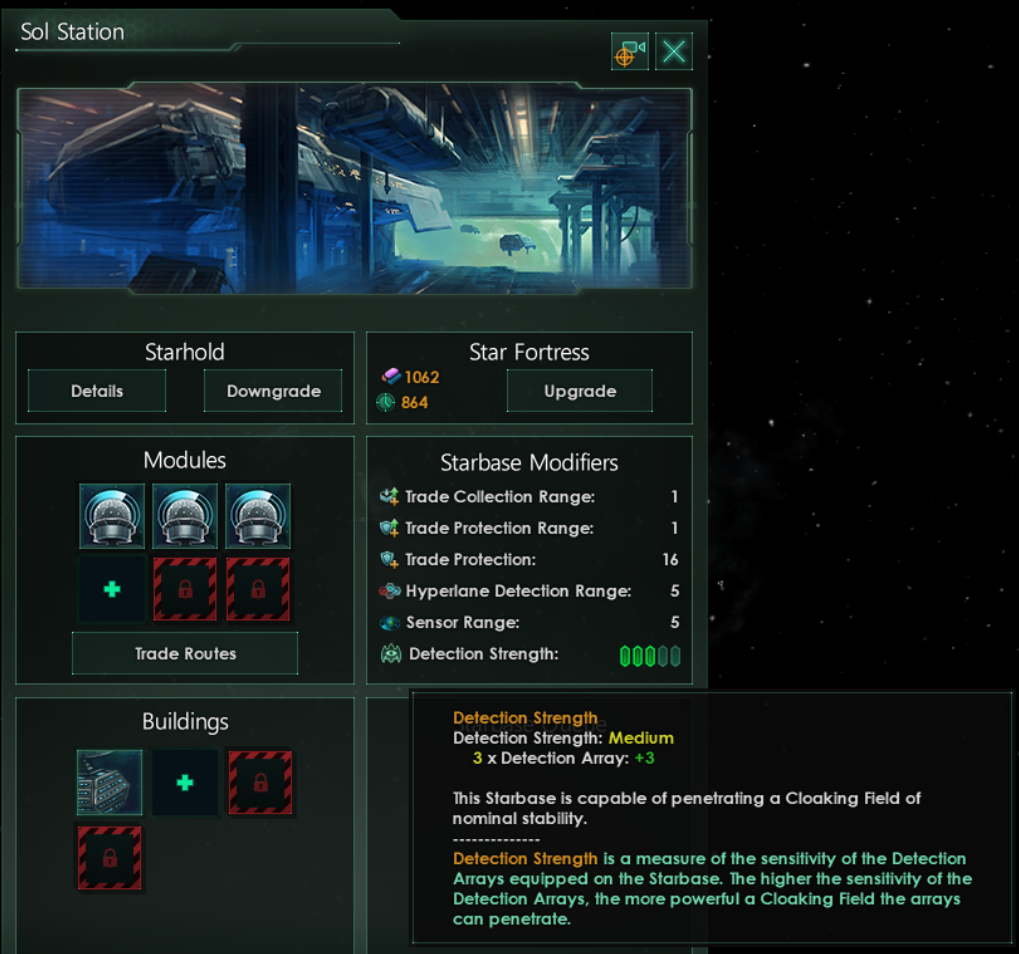
Oh, and we rearranged the starbase UI to list various previously hidden modifiers.
When a fleet is detected by a starbase, it is either detected or forced to decloak depending on these conditions.
- If the cloaked fleet is outside of your borders, you’ll be able to see it, with the cloaking visuals, but it won’t be decloaked.
- If the cloaked fleet is inside of your borders, it will be forced to decloak.
If a cloaked fleet is inside another empire’s borders (and thus is not detected) when you declare war, it will not be forced to go MIA like normal.
Now to hand over to PDS_Iggy to discuss the new civics!
For this story pack we were always on the lookout for flavorful and fun civics we could add to further explore the themes of First Contact. It was thanks to a helpful comment from one of our betas that Alfray and I started to investigate a generic Low-Tech civic. The aim was to add a civic that could be used in combination with other existing origins to get a pre-FTL feel.
After brainstorming and fusing ideas we came up with a low tech civic in which you start with reduced resources and a very limited jumpdrive.
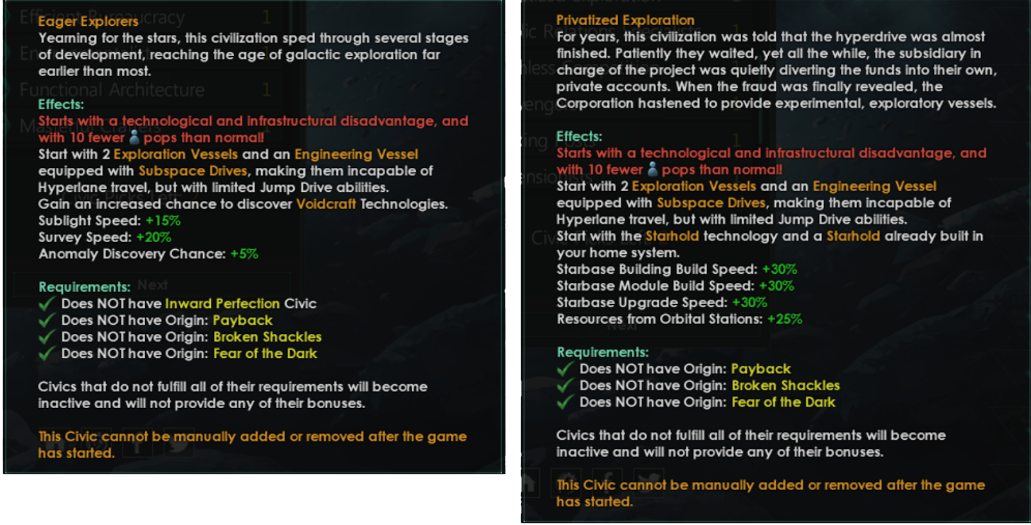
Reaching for the stars, no matter what.
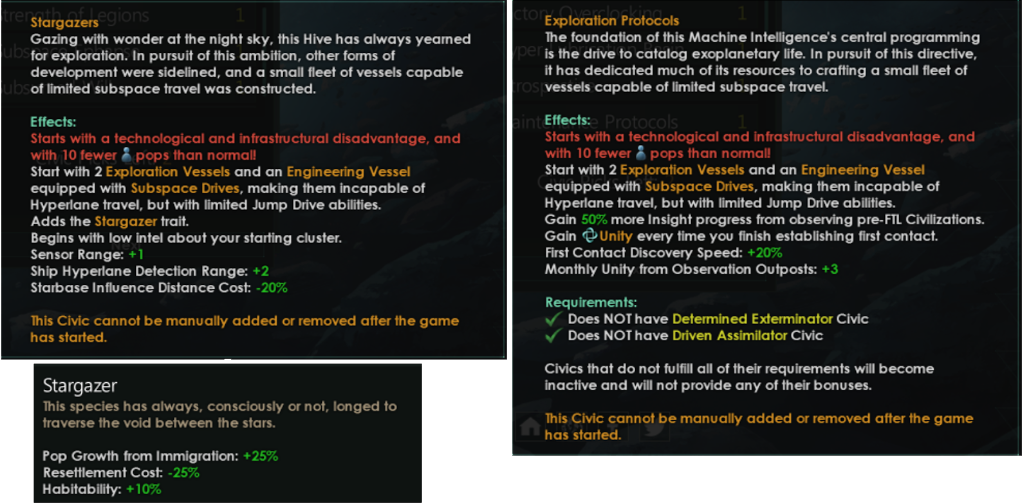
What is out there?
Exploration Vessels are early science ships and Engineering Vessels are simple construction ships.
Alfray and I also wanted to challenge ourselves since civics are often just identical for all government types, so we made a unique one for each government style. In the end we implemented multiple civics that should be able to facilitate many fantasies and builds.

The Stargazers starting info as well as the Jump Range

Look at them go!
And before you ask, you can put these jump drives on your other ships. It’s even something you will have to you will have to do if you want to get our new achievement:
The Path Not Taken – Have 10 colonies without ever discovering Hyperdrives.

Déjà vu!
Finally, I’ll leave you with an in-game gif of the MSI flagship activating its cloaking field.


